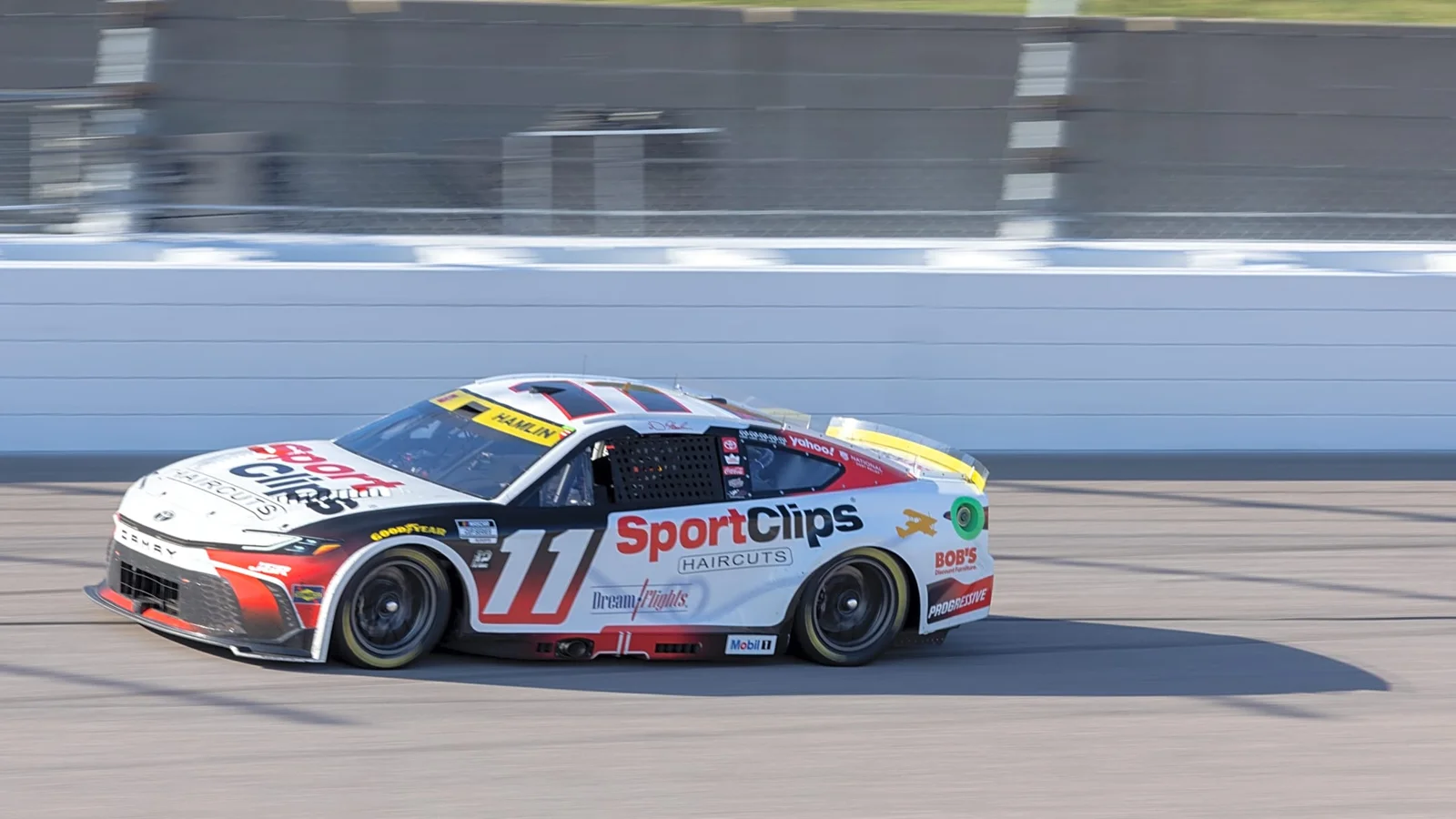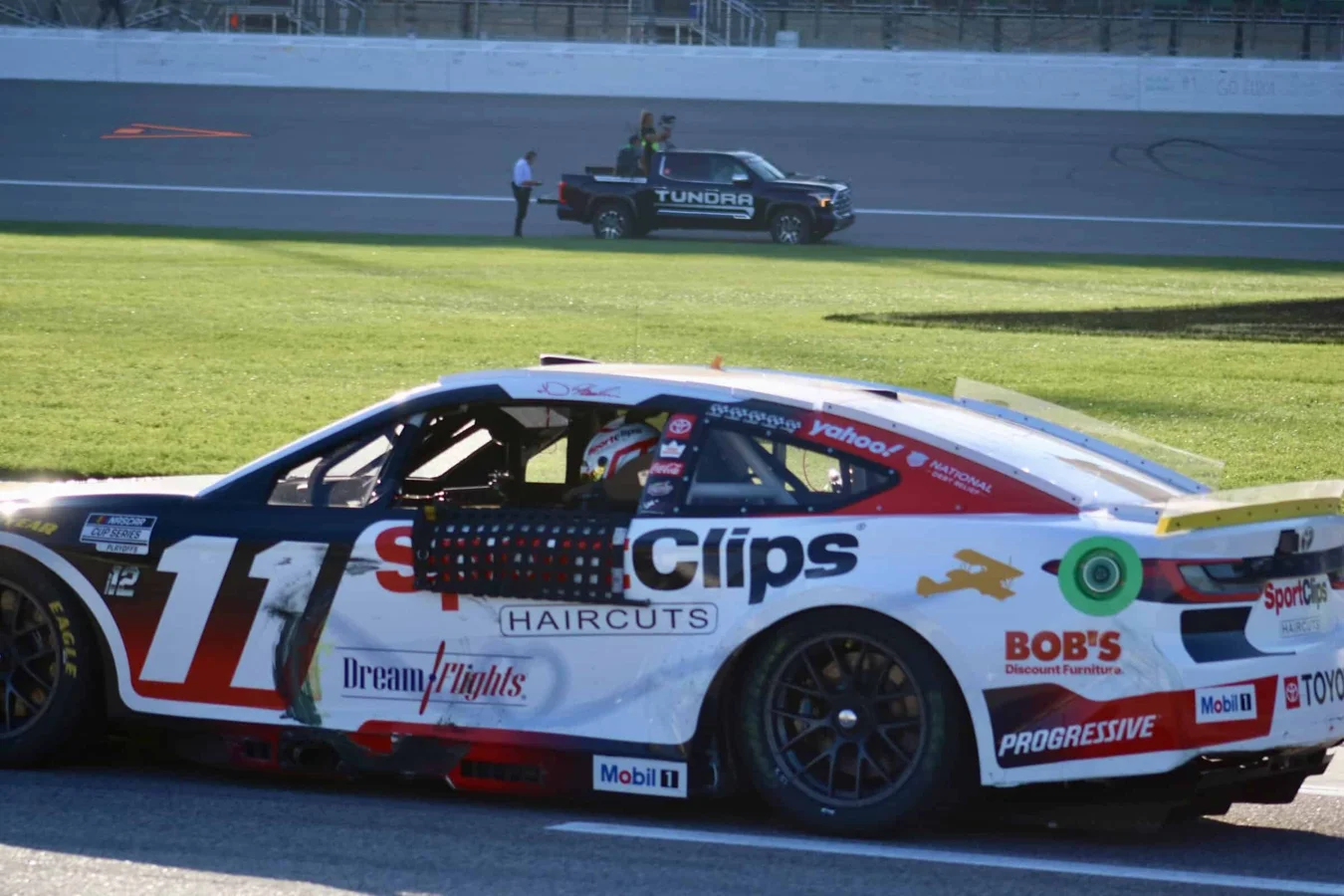Denny Hamlin ignited the Denny Hamlin Kansas race controversy during the 2025 NASCAR Cup Series playoff showdown at Kansas Speedway, where a late-race maneuver with Bubba Wallace reshaped the race’s outcome in dramatic fashion. The incident, unfolding in front of a charged crowd and millions of viewers, not only derailed both drivers’ bids for victory but set off intense debate among fans, broadcasters, and key NASCAR figures about racing ethics and team dynamics.
Hamlin’s Overtime Move Alters the Kansas Race
The Kansas Speedway became a crucible of tension as Denny Hamlin, aiming for his 60th career victory after a stellar start from pole position, dominated the early stages. He led 159 laps, gathered essential stage points, and clocked the fastest lap in the Xfinity series during the race, coming hot off his 59th win at Gateway in the playoffs’ Round of 16. But just as the race crested into its final moments, the entire narrative altered.
As the race entered a two-lap overtime, Hamlin, positioned in sixth, found himself strategizing for a final chance at victory. Targeting Bubba Wallace, who led in a fellow toyota/”>Toyota, Hamlin chose a low line heading into Turn 3, prompting Wallace to scrape the wall. The resulting loss of momentum for both cars opened the door for Chase Elliott, who seized the win, triggering visible frustration in Wallace. In a no-holds-barred post-race statement, Wallace commented,

“He’s a dumb–s for that move. I don’t care if he’s my boss or not,”
—Bubba Wallace, Driver—squarely assigning blame for the incident.
Hamlin’s actions not only inflamed trackside tempers but also further entwined his dual identity as both driver and co-owner of 23XI Racing—a dynamic made more complex by the team’s high-profile ownership with Michael Jordan and its current off-track legal and business challenges. The timing and consequences of Hamlin’s aggressive overtime decision instantly became a major talking point across the NASCAR world.
Steve Letarte’s Perspective: Driver Instincts Collide with Ownership
NASCAR broadcaster Steve Letarte offered an analytical view of the controversy, emphasizing the inherent tension when racing instincts override business alliances.
“You’re on board with driver Denny Hamlin. You’re not on board with team owner Denny Hamlin right here. When he puts his fire suit on, he’s a race car driver,”
—Steve Letarte, NASCAR Broadcaster—he observed, noting the division between Hamlin’s roles on the racetrack and as a team executive.
While Hamlin’s performance was headline-worthy—leading most laps in the Hollywood Casino 400—Letarte pointed out that a crucial pit stop error shifted track position, creating the opportunity and pressure for Hamlin’s bold, if costly, attempt at the win. Letarte further acknowledged,
“He drove down in there and he ran the 23 up, and they got tight, and the 9 gets by…Look, I’m okay with it. It was a pit stop that took him out of the lead. It happens. It’s human error. Issue on the pit stop of the draft,”
—Steve Letarte, NASCAR Broadcaster—explaining the split-second nature and fallout of Hamlin’s risk-taking.
Letarte did not shy away from the emotional aftermath, commenting,
“Bubba Wallace is frustrated, as he should… It’s okay that everybody hates one another. Bubba Wallace, he came over… The day that an owner drives a car as an owner, and that’s not good. That’s not what people buy tickets for. That’s not what people watch for,”
—Steve Letarte, NASCAR Broadcaster—highlighting how the emotional stakes are amplified when on-track aggression involves teammates managed under the same ownership banner.
This tension is especially potent given 23XI Racing’s unique structure—being publicly co-owned by Hamlin and Michael Jordan—and the ongoing scrutiny sparked by their charter situation and recent off-track legal matters. In NASCAR, where sponsors, fans, and teammates closely watch every move, incidents like this reverberate beyond the technical rules and deeply into broader conversations about loyalty, leadership, and optics.
Racing Ethics vs. Desire to Win: Letarte’s Unwavering Support
Reflecting on the racing line Hamlin chose, Letarte remained forgiving of the aggressive approach, stating,
“I want Denny Hamlin to drive for race win 60, and that’s what he did right there. And I’ll be honest. I’ve watched turns 3 and 4 multiple times, and I believe that if Denny doesn’t drive in there very, very deep, the 23 goes around him on the outside. So I’m not sure how Denny does it different and still have a chance to win the race. I’m okay with it all,”
—Steve Letarte, NASCAR Broadcaster—defending the calculated risk.
Letarte added,
“I know that’s unpopular. We’re supposed to have some sort of scientific breakdown. I applaud. No, it’s okay that Bubba Wallace is pissed. That’s okay, too. He should be, because he drove in the door by the guy that owns the car. That’s a frustrating go,”
—Steve Letarte, NASCAR Broadcaster—admitting that emotionally charged reactions are not only understandable but central to NASCAR’s enduring appeal.
The rivalry and emotional fallout between Hamlin and Wallace immediately became a dominant storyline, raising questions about how such a partnership can weather public scrutiny when high-stakes decisions on the track go awry. The debate quickly enveloped social media and sports commentary, with Hamlin’s judgment and Wallace’s anger splitting NASCAR’s audience and stirring reflection on the nature of in-team competition.
Jeff Gordon Offers Empathy as Hamlin Faces Disappointment
Chase Elliott’s late charge from eighth place sealed the victory in a photo finish, just 0.069 seconds ahead of Hamlin, deepening the collective disappointment within the 23XI Racing camp. Hamlin, who’d dominated the first two segments, openly admitted the outcome stung—especially knowing how close he and his team came to a milestone triumph. “I ruined it for us,”—Denny Hamlin, Driver/Co-Owner—he confessed, shouldering responsibility for the missed opportunity and the hard emotions that followed.
Jeff Gordon, former champion and veteran of Joe Gibbs Racing, provided some solace, reflecting on how losses, rather than wins, tend to linger in a driver’s memory.
“I can’t remember many of the ones that I won, but I can tell you all the ones I lost,”
—Jeff Gordon, NASCAR Champion—he shared, voicing solidarity with Hamlin’s sense of defeat. Echoing this theme, Gordon stated,
“And that’s the way I feel right now. I feel pain because we had a golden opportunity right there, and I ruined it for us,”
—Jeff Gordon, NASCAR Champion—capturing the raw disappointment that shadowed Hamlin’s near-miss.
Hamlin’s self-examination was honest and pointed.
“I got really close to the 23. If I had to do it all over again, I think I’d run a little bit lower to allow a space between us so I don’t get so tight,”
—Denny Hamlin, Driver/Co-Owner—he admitted, acknowledging that a poor pit stop and power steering trouble compounded the chaos.
“I wanted it for my dad, for everybody. Just wanted it a little bit too hard,”
—Denny Hamlin, Driver/Co-Owner—he added with emotion, encapsulating his drive and the pressure of playoff expectations.
Despite leaving Kansas Speedway with a strong points standing, Hamlin’s heartbreak was unmistakable. All eyes now turn to Charlotte, where he will again seek that elusive 60th win, fighting both the technical demands of the playoffs and the emotional fallout of a race that electrified the sport.
Broader Impact and What Lies Ahead for 23XI Racing
The Denny Hamlin Kansas race controversy has left ripples not only among the drivers and their immediate teams but throughout NASCAR, raising pointed questions about on-track ethics, the challenges of dual roles, and the volatile blend of business and competition. The spotlight remains fixed on Hamlin, Michael Jordan, Bubba Wallace, and the rest of the 23XI crew as the playoffs progress, with both fans and rivals weighing the fallout from Kansas.
With the race for the NASCAR Cup Series title intensifying, the incident may influence how co-owners and teammates manage internal rivalry, trust, and risk, especially in critical moments. Emotions are certain to run high as Hamlin, Wallace, and their competitors gear up for the challenges ahead, knowing that every move on the track can spark controversy, speculation, and, for better or worse, leave a mark on racing history.
Denny the Owner vs. Denny the Driver.
I'm not sure how he does it different and still have a chance to win the race…
Full Breakdown: https://t.co/taIbNxpWSZ pic.twitter.com/9ycm9KeGfz
— Steve Letarte (@SteveLetarte) September 29, 2025
